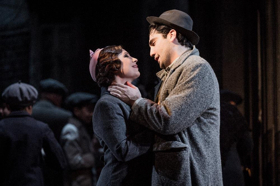Review: LA BOHEME, London Coliseum

![]() The best versions of La bohème are simple enough to let the genius of Puccini's opera shine, rather than distracting the audience with quirky updates and subliminal messages. The ENO's decision to return to Jonathan Miller's luscious production for the fourth time in a decade, is a beautifully pitched celebration of beauty in penury, love and heartbreak.
The best versions of La bohème are simple enough to let the genius of Puccini's opera shine, rather than distracting the audience with quirky updates and subliminal messages. The ENO's decision to return to Jonathan Miller's luscious production for the fourth time in a decade, is a beautifully pitched celebration of beauty in penury, love and heartbreak.
There are no surprises in the production. The most controversial aspect of the production is Miller's decision to move the setting from the 1840s to the 1930s, but it still works, predominantly due to the timeless nature of both the music and the story. The tragic tale of Mimì and Rodolfo who meet and fall in love against a backdrop of poverty could easily become a work of sentimentality and yet the emotional punch of the opera remains as devastating as ever under Natascha Metherell's careful direction.
Mimì is sung by the young Welsh soprano Natalya Romaniw, making a sparkling ENO debut. She has a delicate clarity to her voice that is also well controlled and beautifully pitched. Jonathan Tetleman makes his European debut and sings an equally good Rodolfo. The pair have the vibrant chemistry that is so crucial for this opera to truly touch the heart as it should. Their first love duet induces goosebumps.
Nadine Benjamin gives a light and teasing performance as Musetta. It is great to see her on the Coliseum's stage so soon after her gorgeous turn as Clara in Porgy and Bess. Again, she demonstrates very good acting abilities; she is captivating to watch and sashays around the stage with great confidence.
Nicholas Lester's charming Marcello aligns well with David Soar's strong Colline and Bozidar Smiljanic's charismatic Schaunard. Along with Tetlemans's Rodolfo, the four men express superbly the warmth and joy of their friendship contrasting with the anguish at being so poor and hungry. In the final desperate scene, the audience is devastated not just by the heartbreaking death of Mimì, but also by the abject distress of the friends, weeping by her bedside.
Puccini's score radiates emotion and colour. Conductor Alexander Joel grasps the opera's pacing well and exploits the extreme emotions to their best advantage. He has a good control over the changing moods within the score, particularly from Mimì's aria in Act I to the duet where the couple fall in love. Occasionally during Act I, the orchestra threatens to overwhelm the performers on stage, but balances well later on.
The romantic dereliction of the bohemian garrets of Paris is depicted by Isabella Bywater's cleverly revolving set and Jean Kalman's thoughtful lighting which shows both the cozy warmth of the Café Momus, contrasting starkly with the grey cold of the winter outside. The power cut that prompts Mimì's appearance at Rodolfo's door is a clever touch.
Natascha Metherell's direction is precise and expresses great contrast in the scenes: in particular, there is a huge amount of charm and organised chaos in the convivial Café Momus scene where cross dressers preen at the bar, a couple steal illicit kisses down a side alley and harried waitress attend to customers.
This is a beautifully formed revival that shows all the light and shade in Puccini's score, along with delivering the gut-punch of the inevitable heartbreak at the end.
La bohème is at the London Coliseum until 22 February, 2019
Photo Credit: Robert Workman
Reader Reviews
Videos

